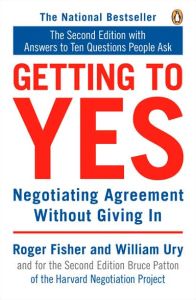Join getAbstract to access the summary!

Join getAbstract to access the summary!
Roger Fisher, William Ury and Bruce M. Patton
Getting to Yes
Negotiating Agreement Without Giving In
Penguin, 1991
What's inside?
Negotiate positions, not people; be fair, amicable and objective. Or if that doesn’t work, get tough (but not ugly).
Recommendation
Authors Roger Fisher, William L. Ury and Bruce M. Patton offer a seminal step-by-step guide to negotiating effectively. The authors use anecdotal examples to illustrate both positive and negative negotiating techniques. They believe that, with principled negotiation, both parties can reach an agreement in an amicable and efficient manner. Principled negotiation is based on the belief that when each side comes to understand the interests of the other, they can jointly create options that are mutually advantageous, resulting in a wise settlement. This classic text is easy to understand, and you can implement its techniques immediately. You can’t ask for more than that.
Summary
About the Authors
Roger Fisher teaches negotiation at Harvard Law School and is director of the Harvard Negotiation Project. He was the originator and executive editor of the award-winning television series, The Advocates. He consults through Conflict Management, Inc., and the Conflict Management Group of Cambridge, Massachusetts. William L. Ury is the author of Getting Past No: Negotiating Your Way from Confrontation to Cooperation. Bruce M. Patton is a co-author of Difficult Conversations: How to Discuss What Matters Most.





















Comment on this summary